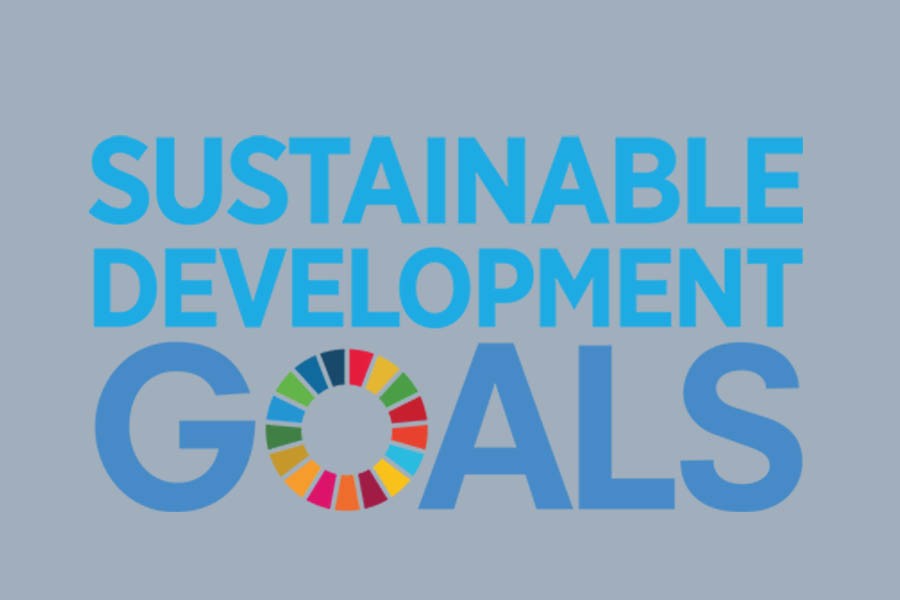Bangladesh's economy needs to grow at a rate of 8.0 per cent or more in the coming years to absorb the country's growing labour force, a recent government report has suggested.
At the same time, attracting more foreign direct investment along with other forms of foreign resources will be crucial for the country to attain the United Nations-mandated Sustainable Development Goals (SDGs), the report has said.
Such views have emerged from the country's first SDG progress report, which has been published recently.
General Economics Division of the Planning Commission has carried out the study to evaluate the country's progress in achieving SDGs.
The report has warned that the country's present GDP growth rate 'does not seem to be sufficient' to absorb the nation's growing labour force.
"The economy needs to grow at a higher rate -- at least 8.0 per cent per annum to absorb the labour force," it said.
Highlighting the challenges in achieving SDG-9 that deals with sustained and inclusive economic growth as well as decent work, the report noted at present, there exists gap between demand for, and supply of, skilled workforce in the country.
The difficulty of finding appropriately skilled workers is a substantial constraint to growth of industries, it said.
"Evidence also indicates that the skills of the workforce are not meeting the demands of emerging or, indeed, established industries," the report argued.
In the informal sector, where about 15 per cent of the labour force is engaged, half of the employment demands are for less than secondary education graduates.
While university graduates are more likely to take professional levels of occupations, there seems to exist a mismatch between the labour market demand for academic specialties and academic disciplines that university students study.
The SDG progress report comes at a time when job creation in line with the nation's growing workforce is becoming a major focus for the country.
"There has always been a strong correlation between economic growth and job creation", said Dr. Zaidi Sattar, Chairman of Policy Research Institute, one of the leading economic think tanks in the country.
"But, as we have seen in case of readymade garments, export oriented manufacturing is the best engine for tying a nation's economic growth with jobs", he told the FE.
"Therefore, to ensure that higher economic growth translates into more jobs, our growth should be led by export oriented and labour incentive manufacturing", Sattar added.
Meanwhile, The GED report also portrayed a sorry state of FDI inflow into the country.
"The net annual FDI flow has been low and concentrated on a few sectors such as textiles and apparels, telecommunication, and energy and power," it observed.
Despite the government's effort to provide FDI-friendly environment in the country by undertaking reforms in a wide range of areas, Bangladesh still has a weak institutional architecture to serve the private investors," it said.
Against this backdrop, the report called for improving broader investment climate as well as strengthening of the investment promotion and facilitation agencies for fostering private and foreign direct investment.
Similarly, measures like continued simplification of regulatory frameworks and procedures for FDI entry and operations as well as the development of an integrated investor service delivery mechanism have also been prescribed in the report.
Apart from job creation and investment, the Planning Commission report has pointed out the country faces formidable challenges in meeting SDG-7, which deals with access to affordable, reliable and sustainable energy.
"LNG imports expose Bangladesh to international gas trade price, which has several consequences," it said.
The weighted average of Bangladesh gas tariff is estimated to jump from USD 1.7 per gigajoules (GJ) to at least USD 3.1 per GJ.
"This price jump will escalate production cost in the industrial sector affecting competitiveness of industries," the report noted.
The report estimated that the emphasis on coal-fired power projects to produce projected amount of electricity will require 60 million tonnes of coal per year.
"Building huge infrastructure including port, rail transport and coal stocking infrastructure to handle this massive volume of coal is a challenge," it warned.
"If electricity price is based on full cost of oil and the opportunity cost of domestic gas -- the economic cost of electricity will be much higher and the resultant electricity price will also be higher," the report has cautioned.
In addition, challenges coming from growing inequality, unplanned urbanisation, climate change as well as problems and prospects emanating from education and health area have also been extensively highlighted in the GED study.
While affirming that the country has gone a long way in reducing poverty, the report noted that many households in Bangladesh live close to the poverty line and any shock can push these households below the poverty line- ruining the gains in poverty reduction.
In this context, the GED report has called for the diversification of every sector including agriculture, manufacturing and labour export.
At the same time, it noted that the National Social Security Strategy requires substantial increase in resources and streamlined efforts for implementation.
While this is the first time that the government has published a full-fledged report on the implementation of SDGs, relevant planners and policy makers are still frustrated with the lack of data required for such a huge undertaking.
"The lack of data is a major challenge for the monitoring of SDGs," said Member of the Planning Commission Professor Dr. Shamsul Alam.
"Even for this report, we have lacking, as we have data for only 70 indicators out of 232 prescribed by the UN," he said.
The economist also called for enhancing the capacity of the Bureau of Statistics to reduce this data gap.
"The relevant ministries also need to step up their efforts to provide reliable and quality data related to SDGs," he added.


